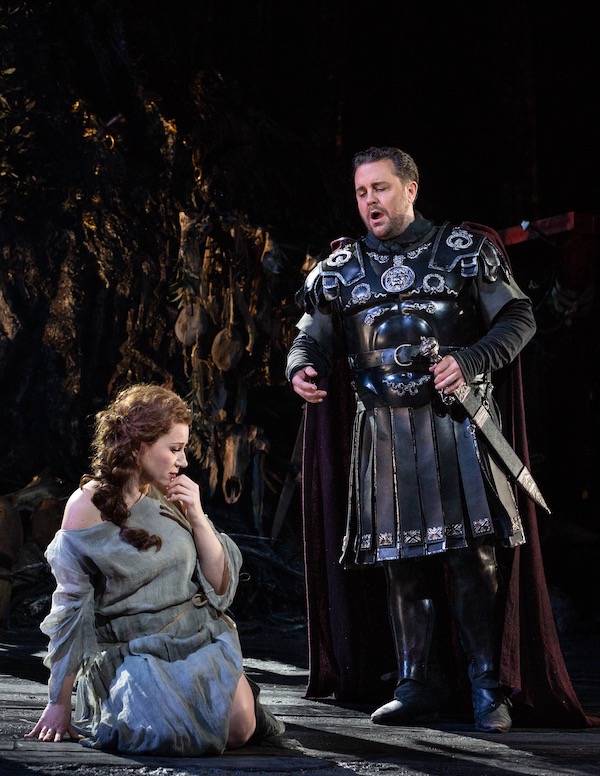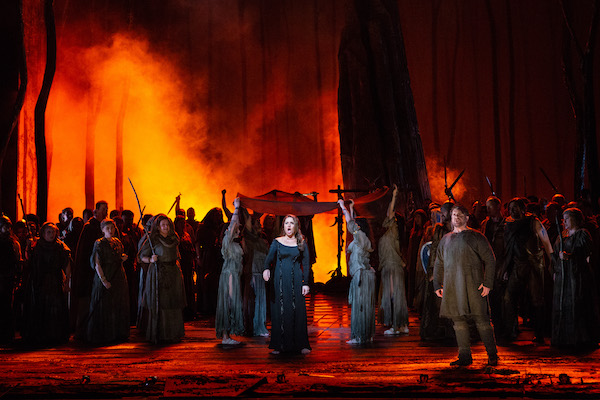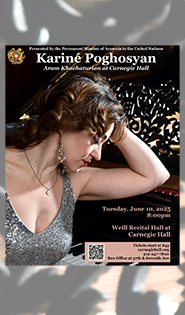A mesmerizing Yoncheva leads a stellar cast in Met’s “Norma”

Bellini’s Norma returned to the Metropolitan Opera on Tuesday evening in David McVicar’s 2017 production. The Scottish director followed the first commandment of bel canto opera: Thou shalt not get between the singer and the music. Called upon to do little more than stand and deliver, this cast did so splendidly. One sat mesmerized by the beauty of their singing and the emotions that they generated through voice alone, with nary a needless visual distraction.
Set in Gaul during the Roman times, the plot centers on the love triangle between Norma, a Druid high priestess, Adalgisa, one of her young acolytes, and the Roman proconsul Pollione. Norma’s father, Oroveso hankers for war, but Norma instead prays for peace, as she is in love with Pollione, who is the father of her two sons. Smitten with Adalgisa, Pollione rebuffs Norma’s advances, and the priestess confesses to treason and is condemned to death.
Robert Jones’s sets are simple and realistic; there is zero scenic folderol. The grove where Norma prays to the mood goddess for peace is a forest of leafless trees. Norma’s dwelling is a Celtic round house made of wattle. In the final scene, Irminsul’s shield dominated the forest and served as the gong which Norma strikes to summon the Druid warriors to war. Scene changes are effectuated swiftly via the Met’s stage elevators, which continue to impress no matter how many times you have seen them in action.
Lighting designer Paule Constable creates evocative atmospheres with moonlight streaming through the trees and the warm glow of daybreak, but is is a dark, bleak world. Well-muscled men in leather straps tend to populate the front of the stage when the Druids gather. They also build the pyre on which Norma will die log by log during the final scene. It’s a bit of disappointment that we don’t actually get to see Norma consumed by flames after McVicar raised expectations so high.
Sonya Yoncheva first appeared in gold as she entered the grove, exuding a mystical, other-worldly sense of serenity and glamour. Yoncheva’s Druid princess was at times almost feral with an animal-like intensity, and at others noble in bearing and voice. She could spin out musical lines effortlessly in her plush, velvety voice—and did so in Norma’s great aria, “Casta Diva”—or hurl vocal fireballs at Pollione with a vengeance. As Norma walked to her death, Yoncheva was again completely veiled, although in funereal black.
As Adalgisa, the ovation which Ekaterina Gubanova received from the audience was all but equal to that which followed for Yoncheva. Gubanova’s natural stage presence coupled with her plummy, vibrant mezzo-soprano, made for a compelling Adalgisa, whose innocence and earnestness was extremely moving. Yoncheva and Gubanova’s voices didn’t blend, so much as contrast in “Mira, o Norma.”
As Pollione, baritenor Michael Spyres got off to a rough start by barreling his way through his Act I aria and cabaletta. His high notes are generally brilliant and thrilling, but the first few came off pinched and stillborn. Spyres settled down for the remainder of the opera and provided some truly beautiful and emotive singing, especially in the ensuing scene with Adalgisa when Pollione attempts to convince her to return to Rome with him.
Christian Van Horn was in fine form as Norma’s bloodthirsty father Oroveso. Tall of stature and commanding of voice, Van Horn was especially effective in the final scene when his vengeful Oroveso melted emotionally and conceded to his daughter’s request that he care for her children.
With his clear, penetrating voice and ease on stage, tenor Yongzhao Yu made an impressive debut as Flavio, Pollione’s companion. As Clotilde, soprano Brittany Olivia Logan, who is in her second year in the Lindemann Young Artist Development Program, displayed a voice as commanding as any on stage.
The Met Chorus and Orchestra responded to conductor Maurizio Benini’s deft touch. Norma is a feast of choral writing, especially for the men, and the Met Chorus sounded fabulous, as did the orchestra, (including the banda playing unseen from the rear of the stage). Highlights were the sinewy string sound and ethereal flute solo that introduces “Casta Diva.”
Benini was greeted with a lukewarm reception and even a few boos when he took his solo bow, but it was hard to fathom why. He instilled the opening measures of the Overture with a driving energy that gripped the listener from the start. Balance was never an issue and he paced the performance expertly.
The demanding title role has assumed almost mythical status due to the great singers who have sung it. Like Cherubini’s Medea, which opened the Met’s current season, Norma is permanently linked with Maria Callas, who made her Met debut in the title role in 1956. The Met is dedicating this season’s performance to her memory on the 100th anniversary of her birth.
Norma continues through March 28. metopera.org






